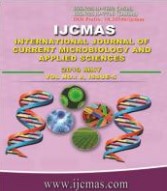


 National Academy of Agricultural Sciences (NAAS)
National Academy of Agricultural Sciences (NAAS)

|
PRINT ISSN : 2319-7692
Online ISSN : 2319-7706 Issues : 12 per year Publisher : Excellent Publishers Email : editorijcmas@gmail.com / submit@ijcmas.com Editor-in-chief: Dr.M.Prakash Index Copernicus ICV 2018: 95.39 NAAS RATING 2020: 5.38 |
Lipases are enzymes that catalyze the transformation reactions of triglycerides in to fatty acids and glycerol. They can be produced by animals, plants and microorganisms. This article presents the isolation of lipase-producing bacteria from soil samples collected from sites contaminated with waste from palm oil production in the littoral region of Cameroon. These permit to isolate a multitude of bacteria capable of producing lipase from Rhodamine B-agar olive oil culture medium. Of the 35 isolates obtained from the 66 soil samples, one was selected as the best based on its enzymatic activity, the DI1A isolate. After production of the crude enzyme, the influence of temperature and pH on it was studied, followed by the impact of some physicochemical parameters on the fermentation medium. The DI1A isolate produced a crude enzyme showing better activity of 5.63±0.31 IU/ml with optimal activity at a temperature of 55°C and a pH of 8. The study of the influence of some physico-chemical parameters on the isolate showed an optimal growth temperature at 38°C, an optimum pH at 7, the best carbon source is palm kernel oil at 1% (v/v), the best nitrogen source is ammonium chloride at 2% (m/v) and the best salt source is magnesium sulphate at 3% (m/v). Macroscopic and microscopic analyses reveal that the DI1A isolate is a Gram+ bacillus, a positive catalase capable of sporulating.
 |
 |
 |
 |
 |